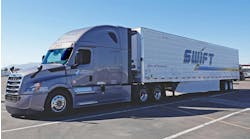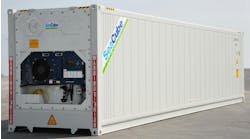UK fleet trials Sunswap’s electric TRUs
Temperature-controlled logistics specialist J.S. Davidson recently completed a trial of Sunswap’s battery- and solar-powered transport refrigeration unit (TRU) technology.
The United Kingdom-based reefer carrier is targeting net zero emissions at its Peterborough headquarters by the end of 2025, and the two-week trial of Sunswap’s Endurance TRU running frozen delivery cycles demonstrated the viability of integrating sustainable solutions into its operations, Sunswap said.
Just another TRU
J.S. Davidson treated the unit as “just another fridge,” incorporating it into drivers’ daily activities without any “disruptions or special treatment,” highlighting the technology’s ability to function as a direct replacement for conventional diesel-powered units.
“Environmental considerations are high on the J.S. Davidson agenda and are taking an increasing number of measures to help us meet our net-zero target,” John Davidson, J.S. Davidson managing director, said in a news release. “Collaborating with Sunswap on this trial has been an eye-opening experience. The Endurance unit not only met but exceeded our expectations in terms of performance and reliability.
“We are thrilled to be at the forefront of trialing sustainable refrigeration technology that aligns with our commitment to reducing our environmental impact.”
Data collected during the trial period demonstrated refrigerated fleets can remove 519 tonnes (572 U.S. tons) of CO2 and 5 tonnes (5.5 U.S. tons) of NOx over the lifetime of five units, Sunswap reported. The trailer-top solar panels collected free energy during the trial, reducing reliance on grid charging. Simulations based on 10 years of weather data suggest solar energy could contribute up to 37% of the unit’s energy needs during spring months, highlighting the potential for solar power to provide benefits such as extended range, reduced operation costs, and reduced battery cost and weight.
Savings for operators
The benefits do not stop at the environment. Adopting five Endurance units also could result in a 70% reduction in operational expenses compared to diesel, Sunswap said.
The trial underscores the “immense” potential for battery and solar-powered refrigeration to decarbonize the temperature-controlled logistics industry. By harnessing grid electricity and the power of renewable solar energy, companies like J.S. Davidson can reduce their carbon footprint and operational costs while maintaining the highest standards for the transport of temperature-controlled goods.
“Our partnership with J.S. Davidson is a testament to the viability and effectiveness of our battery- and solar-powered refrigeration technology,” said Alastair Gough, head of business development at Sunswap. “The Endurance unit’s performance during this trial demonstrates that sustainable solutions can seamlessly integrate into existing logistics operations, delivering tangible benefits for both businesses and the environment.”




